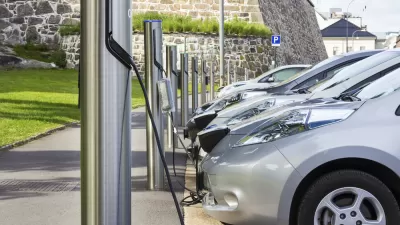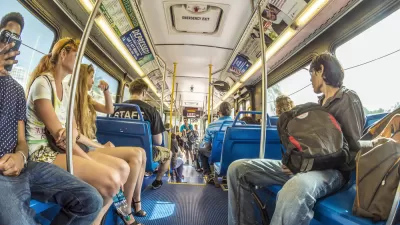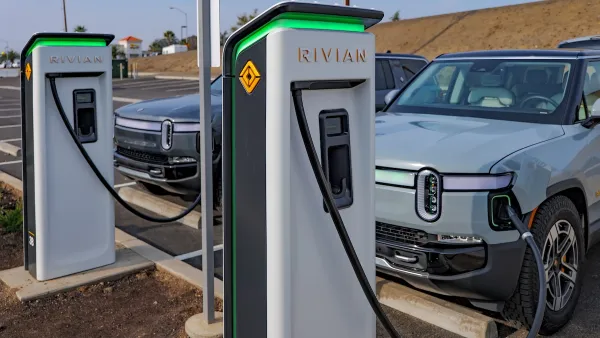The federal government can encourage public transit use and electrification through reforms in transportation systems and land use policies.

As climate change intensifies, writes Kevin DeGood, "[t]he United States must adopt policies and make investments to achieve net-zero GHG emissions by midcentury." Two important steps: "electrifying vehicles and reducing the automobile dependence of communities," which includes "[r]apid electrification of transportation powered by renewable energy."
"In addition to electrification, the federal government needs to substantially reform its transportation policies to reduce auto dependence by directing funds to projects that expand transportation choice—including transit, biking, and walking—and encourage infill development," says DeGood. "Climate change cannot be addressed without reforming land use, and land use cannot be changed without reforming transportation."
The design of transportation systems "has important implications for not only driving and mobile emissions but also the economic productivity of those facilities and the long-term cost burden associated with maintenance." DeGood compares Ohio and Washington, D.C.'s systems: "every lane mile of roadway in Washington, D.C., supports, on average, 4 1/2 times as many residents as in Ohio. … Stated differently, every dollar spent on building and maintaining the roadway network in Washington is providing a larger economic return on investment than the equivalent dollar spent in Ohio." Yet "83 percent of Ohio adults drive to work alone, while only 4 percent take transit, bike, or walk. In Washington, only 34 percent of residents drive alone, while 53 percent take transit, bike, or walk."
"Congress is currently debating the reauthorization of federal highway, transit, and passenger rail programs. The U.S. House of Representatives has passed the INVEST Act, which contains several key policy reforms to address climate change and improve overall system performance." The act, writes DeGood, could be "a strong step in a new direction, pushing states and regions to make different, more sustainable, and more productive investments with federal dollars."
FULL STORY: To Tackle Climate Change, We Must Reform Land Use

Maui's Vacation Rental Debate Turns Ugly
Verbal attacks, misinformation campaigns and fistfights plague a high-stakes debate to convert thousands of vacation rentals into long-term housing.

Planetizen Federal Action Tracker
A weekly monitor of how Trump’s orders and actions are impacting planners and planning in America.

San Francisco Suspends Traffic Calming Amidst Record Deaths
Citing “a challenging fiscal landscape,” the city will cease the program on the heels of 42 traffic deaths, including 24 pedestrians.

Defunct Pittsburgh Power Plant to Become Residential Tower
A decommissioned steam heat plant will be redeveloped into almost 100 affordable housing units.

Trump Prompts Restructuring of Transportation Research Board in “Unprecedented Overreach”
The TRB has eliminated more than half of its committees including those focused on climate, equity, and cities.

Amtrak Rolls Out New Orleans to Alabama “Mardi Gras” Train
The new service will operate morning and evening departures between Mobile and New Orleans.
Urban Design for Planners 1: Software Tools
This six-course series explores essential urban design concepts using open source software and equips planners with the tools they need to participate fully in the urban design process.
Planning for Universal Design
Learn the tools for implementing Universal Design in planning regulations.
Heyer Gruel & Associates PA
JM Goldson LLC
Custer County Colorado
City of Camden Redevelopment Agency
City of Astoria
Transportation Research & Education Center (TREC) at Portland State University
Jefferson Parish Government
Camden Redevelopment Agency
City of Claremont





























